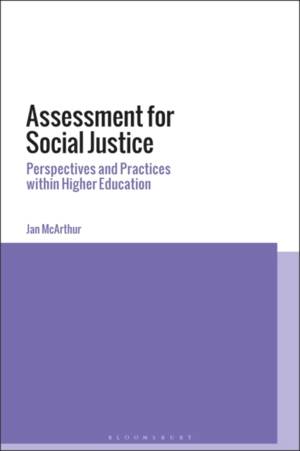
En raison d'une grêve chez bpost, votre commande pourrait être retardée. Vous avez besoin d’un livre rapidement ? Nos magasins vous accueillent à bras ouverts !
- Retrait gratuit dans votre magasin Club
- 7.000.000 titres dans notre catalogue
- Payer en toute sécurité
- Toujours un magasin près de chez vous
En raison de la grêve chez bpost, votre commande pourrait être retardée. Vous avez besoin d’un livre rapidement ? Nos magasins vous accueillent à bras ouverts !
- Retrait gratuit dans votre magasin Club
- 7.000.0000 titres dans notre catalogue
- Payer en toute sécurité
- Toujours un magasin près de chez vous
Assessment for Social Justice
Perspectives and Practices Within Higher Education
Jan McArthur
Livre relié | Anglais
296,95 €
+ 593 points
Format
Description
Assessment for Social Justice takes the established idea of 'assessment for learning' and extends it to consider how assessment contributes to social justice within and through higher education. Jan McArthur invites the reader to rethink familiar positions on assessment and fairness and seeks to explore the full complexity of a critical theory-inspired notion of social justice. She positions her work in contrast to more procedural approaches to social justice, such as John Rawls's influential theorisation of social justice. In contrast, McArthur draws on the work of third generation critical theorist, Axel Honneth, and takes inspiration from Honneth's three realms of mutual recognition in order to reconsider the nature of assessment relationships and practices. A further theoretical strand is introduced in the form of social practice theory, and particularly the work of Theodore Shatzki. McArthur provides a theoretically rigorous understanding of assessment as a social practice, and as a vehicle both for and against social justice. Together with critical theory, this work enables a realizable vision of an alternative approach to assessment in higher education, where the underlying aim is greater social justice. McArthur argues that students must be nurtured to recognise the social contribution that they can make as a result of engaging with knowledge in higher education, rather than defining their achievements in terms of a mark, grade or degree classification.
Spécifications
Parties prenantes
- Auteur(s) :
- Editeur:
Contenu
- Nombre de pages :
- 232
- Langue:
- Anglais
Caractéristiques
- EAN:
- 9781474236065
- Date de parution :
- 22-03-18
- Format:
- Livre relié
- Format numérique:
- Genaaid
- Dimensions :
- 157 mm x 236 mm
- Poids :
- 498 g

Les avis
Nous publions uniquement les avis qui respectent les conditions requises. Consultez nos conditions pour les avis.






